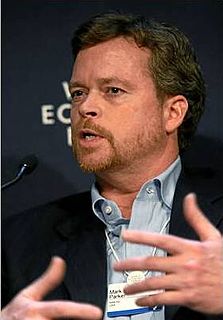Top 1200 Innovation Quotes & Sayings - Page 3
Explore popular Innovation quotes.
Last updated on December 4, 2024.
To most observers, innovation is a solitary process that requires creativity and genius, perhaps even greatness. It can't, in their view, be managed or predicted, just hoped for and, perhaps, facilitated. But for me innovation was and still is more than that. It was a battle in the marketplace between innovators or attackers trying to make money by changing the order of things, and defenders protecting their cash flow.
Innovation is fostered by information gathered from new connections; from insights gained by journeys into other disciplines or places; from active, collegial networks and fluid, open boundaries. Innovation arises from ongoing circles of exchange, where information is not just accumulated or stored, but created. Knowledge is generated anew from connections that weren't there before.
Once you have an innovation culture, even those who are not scientists or engineers - poets, actors, journalists - they, as communities, embrace the meaning of what it is to be scientifically literate. They embrace the concept of an innovation culture. They vote in ways that promote it. They don't fight science and they don't fight technology.
Prosperity in human society is misunderstood. The difference between a rich and poor society is the number of problems that society solves for its citizens. That means technological innovation is the source of all prosperity, but with every tech innovation, you also get disruption - ultimately, social and civic disruption.
In Dublin, we open The Dock, our new multidisciplinary innovation R&D and incubation hub where all elements of our innovation architecture come to life. The Dock is a launch pad for our more than 200 researchers to innovate with clients and acquisition partners with a particular focus on artificial intelligence.
The United States is the nation of innovation. And we have the best innovators, really, in the world. Our international property is one of our huge national economic assets. Yes, so to the extent that some are seeking to infiltrate our network, steal that information, not to have invest in the research and development that goes into innovation, that's a really big deal.
Local brands evoke national pride, are seen as less profit-oriented, and are often formed on deep local insights. But quality worries persist, innovation is questioned, the information can be woefully inadequate, they are sometimes seen to be opaque and their advertising is clearly recognised as not being of a global standard. For local brands, quality, innovation and transparency are critical hills to climb.
Ultimately, the current argument is "not having net neutrality will hurt innovation," and you can make that argument, but I would rather make the public good argument, which is not just about innovation or nurturing new companies that will add to the nation's GDP, it's actually about creating a democratic public sphere.
The two parties which divide the State, the party of Conservatism and that of Innovation are very old, and have disputed the possession of the world ever since it was made ... Now one, now the other gets the day, and still the fight renews itself as if for the first time, under new names and hot personalities ... Innovation is the salient energy; Conservatism the pause on the last movement.
Creativity is the generation and initial development of new, useful ideas. Innovation is the successful implementation of those ideas in an organization. Thus, no innovation is possible without the creative processes that mark the front end of the process: identifying important problems and opportunities, gathering relevant information, generating new ideas, and exploring the validity of those ideas.
Unfortunately, in rich-world health, innovation is both your friend and your enemy. Innovation is inventing organ replacement, joint replacement. We're inventing ways of doing new things that cost $300,000 and take people in their 70s and, on average, give them an extra, say, two or three years of life. And then you have to say, given finite resources, should we fire two or three teachers to do this operation?
Trust the young people; trust this generation's innovation. They're making things, changing innovation every day. And all the consumers are the same: they want new things, they want cheap things, they want good things, they want unique things. If we can create these kind of things for consumers, they will come.
I look forward to working closely with the Research Councils, Innovate UK, and Higher Education Funding Council for England (HEFCE), as we work together to create UKRI. I also look forward to working closely with all of our research and innovation communities to provide a strong and coherent voice for U.K. science and innovation.
If you want the best things to happen in corporate life you have to find ways to be hospitable to the unusual person. You don't get innovation as a democratic process. You almost get it as an anti-democratic process. Certainly you get it as an antithetical process, so you have to have an environment where the body of people are really amenable to change and can deal with the conflicts that arise out of change an innovation.
In general, the questions that are on our mind are the same questions that have been driving our work over the past decade. How do we bring order to this messy, unpredictable world of innovation? How can we dramatically improve the chances of creating a successful new-growth business? How can we do this again and again? More specifically, it has become very clear that the fundamental paradigms of market segmentation and branding are badly broken - and we're working on developing more useful theories for these dimensions of innovation.
Innovation is doing something in a different way, but it also has a subtext: When there's an established way, and that way is considered the best practice and how it's traditionally been done, innovation comes by and says 'Let's try a different approach.' It doesn't need to be big or company-wide - it could be a single thing.
We always say Jordan is not rich in natural resources - we don't have oil or gas like some of our neighbors do - but I think in terms of human resources, we are quite lucky and we are really trying to foster an environment of innovation and technology. I think Jordan will emerge as a center of innovation in the Middle East.
The government also has to get the public rules right. That means putting a price on carbon, so the cleaner forms of energy become more competitive. As soon as that happens, a tidal wave of new capital, innovation and entrepreneurship will flood into the clean energy space - creating new jobs and opportunities for Americans of all walks of life. We did that for the internet, with public investments in the basic system through the Pentagon, followed by rules that encouraged innovation and competition. And that is why the internet took off in the United States first.
Creative experimentation propels our culture forward. That our stories of innovation tend to glorify the breakthroughs and edit out all the experimental mistakes doesn't mean that mistakes play a trivial role. As any artist or scientist knows, without some protected, even sacred space for mistakes, innovation would cease.
It's impossible to have a coin with only one side. You can't have heads without tails. Innovation is like that. Initiative is like that. Art is like that.
You can't have success unless you're prepared to have failure.
As soon as you say, 'failure is not an option,' you've just said, 'innovation is not an option.'
The paramount doctrine of the economic and technological euphoria of recent decades has been that everything depends on innovation. It was understood as desirable, and even necessary, that we should go on and on from one technological innovation to the next, which would cause the economy to "grow" and make everything better and better. This of course implied at every point a hatred of the past, of all things inherited and free. All things superceded in our progress of innovations, whatever their value might have been, were discounted as of no value at all.
There are two sure ways to fail: never get started and quit before you succeed. Many companies promote the language of risk-taking and innovation but are so concerned with short term profit goals that their culture discourages innovation (trying new things) and abandons promising projects too soon. It shouldn't require exceptional moral courage to try new things and stick with them.
Energy is a sector of the economy that has been particularly resistant to innovation. This is precisely the problem. It is why we are still dependant on energy sources that are 100 to 150 years old while virtually every other sector of the economy has transformed itself. This is why we believe that the faith that many environmentalists still hold that carbon regulations and taxes will drive sufficient private sector investment into energy markets to create the kind of innovation we need is unfounded.
Designers are by nature more inquisitive, more connected. They dig a little deeper in terms of insights. They turn those insights into innovation. That connection to the consumer is absolutely critical in driving innovation. It’s critical that design isn’t subjugated to the back room as a short order cook for marketing or for merchandising or sales. It has to be up front.
There can be no solution to the challenge of climate change that is not global. But if we can come together in partnership, we can transform today's challenge into tomorrow's opportunity - an opportunity for green growth and sustainable prosperity... we also need a strong bottom-up push from academics and opinion-shapers such as you. Universities such as yours are founts of ideas and innovation. They are furnaces of innovation and entrepreneurship. So, send forth this word.
Tech companies like to set stretch goals, like we'll try to be the best company for women and minorities, and we have to ask, "What does that really mean?" By setting a goal like that, it makes all of us pay attention to that idea and try to innovate around it, to understand the underpinnings. One piece is being transparent, saying "Hey, we have an issue, we're open to innovation on it." It's important for innovation to prove that more diversity makes better products.
Furthermore, we believe that health care reform, again I said at the beginning of my remarks, that we sent the three pillars that the President's economic stabilization and job creation initiatives were education and innovation - innovation begins in the classroom - clean energy and climate, addressing the climate issues in an innovative way to keep us number one and competitive in the world with the new technology, and the third, first among equals I may say, is health care, health insurance reform.
One of the basics of a good system of innovation is diversity. In some ways, the stronger the culture (national, institutional, generational, or other), the less likely it is to harbor innovative thinking. Common and deep-seated beliefs, widespread norms, and behavior and performance standards are enemies of new ideas. Any society that prides itself on being harmonious and homogeneous is very unlikely to catalyze idiosyncratic thinking. Suppression of innovation need not be overt. It can be simply a matter of peoples walking around in tacit agreement and full comfort with the status quo.
Generally, the technology that enables disruption is developed in the companies that are the practitioners of the original technology. That's where the understanding of the technology first comes together. They usually can't commercialize the technology because they have to couple it with the business model innovation, and because they tend to try to take all of their technologies to market through their original business model, somebody else just picks up the technology and changes the world through the business model innovation.
But innovation is more than a new method. It is a new view of the universe, as one of risk rather than of chance or of certainty. It is a new view of man's role in the universe; he creates order by taking risks. And this means that innovation, rather than being an assertion of human power, is an acceptance of human responsibility.
Sustaining innovation is the lifeblood of any enterprise. It is the time when we capitalize upon, and recover from, all the disruptive change prior. Most of the operating profits in the world come from sustaining innovation. Much of the market capitalization gains, on the other hand, come from disruptive innovations.
I am convinced that an electronic machine, no matter how smart and intelligent, being still a mere spatial structure in concept, can neither innovate nor even understand the self-evident proposition: 'No spatial structure can be a representation of any feeling'. Such innovation can only be a work of a non-spatial mind, like a human being, and only such innovation, it should be acknowledged, can pave the way for further scientific achievements.
It's nice for me to have a ballet as a kind of platform for creativity, because unlike modern dance or contemporary dance or downtown dance, ballet is formalized, and there's something orthodox about it that I like. I like that there's less emphasis on subversion and innovation. I actually think that my musical vernacular or my musical voice is also less inclined toward innovation and subversion. I think I'm a traditionalist.
Making loans and fighting poverty are normally two of the least glamorous pursuits around, but put the two together and you have an economic innovation that has become not just popular but downright chic. The innovation - microfinance - involves making small loans to poor entrepreneurs, usually in developing countries.























































